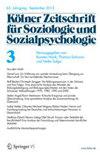通过理论形成和理论验证社会心理学的数量重建(逆向)手段
IF 0.9
3区 社会学
Q4 PSYCHOLOGY, SOCIAL
Kolner Zeitschrift Fur Soziologie Und Sozialpsychologie
Pub Date : 2006-01-01
DOI:10.1024/0044-3514.37.3.205
引用次数: 4
摘要
总结:社会心理学总是报道新的现象,没有把它们嵌进主流理论之内。这种行为终究是人为的。这里介绍了一种量化重建方法,它可以更好地扩展数据信息并形成类似的效果。针对目标的理论和实现方法设计了一个信息收集模型并证明,现存理论可以通过技术重建的结果来重新评估。计算方法:量化重建,根据社会心理学,分析家方法,信息整合理论和我不是了但这方法很投入这项帮助、数据和数据能够发挥最大的潜力,并比他们更有经验。量化重建是误解理论的序幕。一个信息整合的模式是建立在这样一种误解的理论的基础上,这完全因为没有结果。本文章由计算机程序翻译,如有差异,请以英文原文为准。
Quantitative Rekonstruktionen (Retrognosen) als Instrument der Theorienbildung und Theorien- prüfung in der Sozialpsychologie
Zusammenfassung: In der Sozialpsychologie werden immer neue Effekte berichtet, ohne dass sie in ubergreifende Theoriekonzepte eingebettet werden. Dieses Verhalten fuhrt letztlich zu Theorienarmut. Hier soll nun eine Methode, die quantitative Rekonstruktion, vorgestellt werden, mit deren Hilfe Dateninformationen besser ausgeschopft und so vergleichbare Effekte in einen theoretischen Zusam- menhang gestellt werden konnen. Theorie und Durchfuhrung der quantitativen Rekonstruktion werden am Beispiel der kognitiven Dis- sonanztheorie gezeigt. Dabei wird ein Informationsintegrationsmodell entworfen und gezeigt, dass die Dissonanztheorie durch die Er- gebnisse der quantitativen Rekonstruktion ganz neu bewertet werden kann. Schlusselworter: quantitative Rekonstruktion, Methodologie der Sozialpsychologie, Dissonanztheorie, Informationsintegration Quantitative Reconstruction as an Instrument in the Methodology of Social Psychology Abstract: In social psychology, more and more effects are reported without embedding these effects into a widespread theoretical concept. In the end, this behavior leads to a poverty of theories. In this article a new method is introduced, quantitative reconstruction. With its help, data information can be utilized to the full potential and by doing so comparable effects could be connected to one theoretical context. Theory and realization of quantitative reconstruction are demonstrated by the example of the theory of dissonance. A model of information integration is constructed and it is shown that the theory of dissonance can be reinterpreted because of the results of quan- titative reconstruction.
求助全文
通过发布文献求助,成功后即可免费获取论文全文。
去求助
来源期刊
CiteScore
2.30
自引率
6.70%
发文量
55
期刊介绍:
The sociology journal Kölner Zeitschrift für Soziologie und Sozialpsychologie (KZfSS) ("Cologne Journal of Sociology and Social Psychology") was founded in 1948 by the Cologne sociologist Leopold von Wiese as the Kölner Zeitschrift für Soziologie. His successor, René König, broadened the journal''s scope towards social psychological topics, including cultural sociology and qualitative social research, which gave the journal its current name.
KZfSS is the most important sociological publication in the German-speaking world in terms of its scope and distribution. It publishes comprehensively on German sociological research in all disciplines and regularly communicates research results from many countries around the world.
KZfSS follows the model of a universal sociology journal. In addition to more than 40 double-blind peer-reviewed original research articles per year, it publishes detailed literature reviews and book reviews of German and international literature in a comprehensive review section. The journal thus provides a forum for sociological research and open discussion. Special emphasis is placed on offering young colleagues an opportunity for their first publication.
The journal is included in many renowned scientific Abstracting & Indexing databases such as the Social Science Citation Index.
In addition to the four annual issues, a supplement coordinated by guest editors is published annually.

 求助内容:
求助内容: 应助结果提醒方式:
应助结果提醒方式:


